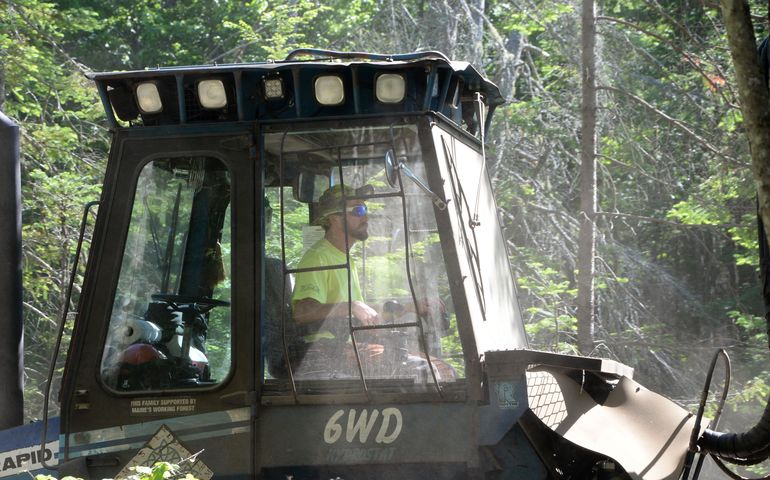Maine loggers welcome fed relief bill as industry struggles
 Courtesy / Professional Logging Contractors of Maine
Maine’s loggers are a vital part of the state’s forest products sector, which is worth an estimated $7.7 billion annually. In this photo taken earlier this summer, Corey Ridley of L&A Ridley Inc. is running a forestry vehicle known as a forwarder.
Courtesy / Professional Logging Contractors of Maine
Maine’s loggers are a vital part of the state’s forest products sector, which is worth an estimated $7.7 billion annually. In this photo taken earlier this summer, Corey Ridley of L&A Ridley Inc. is running a forestry vehicle known as a forwarder.
Maine loggers worried about the industry's ability to weather pandemic-related market and revenue losses have welcomed a federal relief bill introduced this week.
The bipartisan bill, introduced by lawmakers including U.S. Rep. Jared Golden, D-Maine 2nd District, and U.S. Sen. Susan Collins, R-Maine, would set up a new program at the U.S. Department of Agriculture to provide direct payments to timber companies that can show they experienced significant hardships this year.
Nationwide, the logging industry has been hurt by a steep decline in demand for wood fiber since the start of the pandemic, leading to an estimated drop in timber prices of 20% or more.
In Maine, the industry generates an estimated $619 million in economic output every year and provides $342 million in income to around 9,000 Mainers, most of whom live in rural communities. Logging is also a vital part of the state's forest products sector, worth an estimated $7.7 billion annually.
During the pandemic, the industry in Maine suffered another setback in April when an explosion at the Androscoggin Mill in Jay shut the facility down temporarily and reduced its capacity upon reopening. That facility is one of the largest timber purchasers in the state, receiving about 150 to 175 truckloads of wood daily under normal conditions.
H.R. 7690 and S.4233 aim to help the sector at a critical time.
“Logging has provided good jobs and supported rural communities in Maine for generations,” Golden said in a news release.
“But today, our loggers and truckers face two major challenges they have no control over: sinking demand from the coronavirus recession and a disruption in the market following the accident at the mill in Jay. Congress has recognized the unique role farmers and fishermen play in their rural communities, and taken action to provide relief funds to those industries. Loggers are taking a serious hit and deserve the same support."
Reflecting on "significant headwinds" facing the industry and recent incidents including the explosion in Jay and the shutdown of the paper machine at Sappi in Westbrook, Collins said: "COVID-19 has only compounded these challenges. Maine’s family logging and log hauling businesses need our support. Our bipartisan bill would provide critical financial assistance to the skilled professionals who work in this industry to help them get through this difficult period.”
U.S. Sen. Angus King, I-Maine, a co-sponsor of the bill, expressed a similar sentiment in a statement emailed to Mainebiz.
“For generations, the logging industry has supported rural Maine communities and bolstered our state economy,” King said. “The hard work and dedication of Maine loggers is unparalleled — but right now, they’re facing challenges outside of their control. In order to secure the livelihood of our loggers and ensure they can continue to play a central role in our state’s forest economy, Congress needs to step up and help these folks bridge the gap during this unprecedented crisis.”
Loggers 'need help now'
The Augusta-based Professional Logging Contractors of Maine, which led early efforts to seek the proposed federal relief package, said that if the bill passes, it would be the first direct aid to the logging and forest trucking industry since the start of the pandemic and perhaps one of the only times that Congress has helped loggers and truckers directly.
“The economic uncertainty and loss of markets created by the COVID-19 pandemic have hit the Maine logging and forest trucking industry at a time when it was already suffering from the effects of a mild winter, early spring, and low profit margins,” said Dana Doran, the group's executive director.
"Without federal relief," he added, "many in this industry will not survive. They need help now."













0 Comments